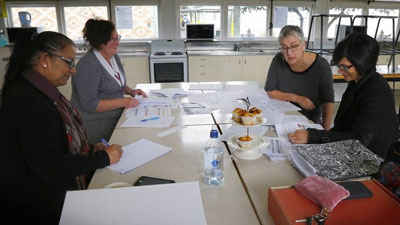Whanganui teachers work together on National Standards

Food technology teachers at their moderation meeting hosted by Whanganui High School on Tuesday 12 September.
From left: Anil Singh, Linda Hardcastle (WHS teacher), Christine England and Tui Bermeister (WHS teacher)
PHOTO / Bevan Conley.
Teachers from secondary schools throughout the wider Whanganui area gathered last week to moderate each other's work.
More than 120 teachers from nine schools held moderation meetings on Tuesday at Whanganui High School.
Whanganui High School principal Martin McAllen said when students get to Year 11-13 their assessment is done through unit and achievement standards. The standards are moderated by NZQA, the organisation which ensures New Zealand education standards are robust.
"Every time a teacher marks a standard they have to be moderated. We submit a selection of our standards to NZQA," Mr McAllen said.
The moderation meetings - held in a number of subject areas - help teachers from different schools share best practice in marking standards.
Mr McAllen said many of the teachers brought along samples of their marking.
"They might bring along something that was especially tricky to mark, or something that was on the borderline between merit and excellent, for example. They can get feedback from other teachers on their marking."
Mr McAllen said the moderation meetings were valuable for all teachers, but particularly for those from smaller schools, where there may be only one or two teachers for a subject.
"It also helps to build those connections between the different schools," he said.
This is the second moderation meeting among Whanganui secondary schools this year. There was one held in term two at Wanganui Collegiate School.
The schools represented at the meetings were Whanganui High School, Wanganui Collegiate, Whanganui Girls College, Whanganui City College, Cullinane College, Rangitikei College, Nga Tawa Diocesan School, Patea Area School and Ruapehu College.
Subject areas included digital technology, English, ESOL, languages, learning support, mathematics, materials technologies, performing arts, physical education and health, sciences, social sciences, te reo and visual art.
By Anne-Marie McDonald
Wanganui Chronicle 18/9/17
